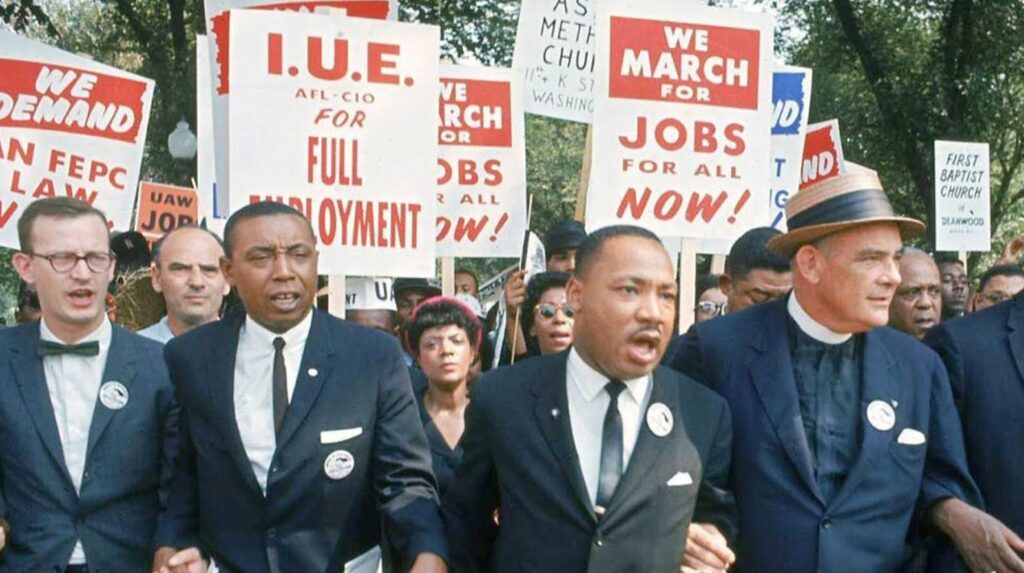On the third Monday of January every year, the entire nation is called to pause in remembrance of Dr. Martin Luther King Jr., the renowned activist and minister assassinated in 1968. The federal holiday was designated to honor a civil rights hero, whose accomplishments have continued to inspire generations of Americans. Dr. King challenged America to live up to its founding dream of freedom. We have memorialized his words as a call for equity and inclusion in today’s world. And, his activism helped pull back the curtain on the hatred and mistreatment of Black Americans. It’s for this cause that he gave his life and why the national holiday is well-deserved.
The Irony of MLK Day
Despite that, it is riddled with irony and contradictions. The same government that threatened him, spied on him, and blackmailed him, is the same government that granted him a national holiday and even that was done begrudgingly many years after his death. In 1968, only four days after his assassination, former Congressman John Conyers Jr. introduced the bill to recognize the civil rights leader’s birthday as a federal holiday but that request was widely ignored by his compatriots in Capitol Hill. Neither Congress nor the country had recognized MLK Day until 1986, nearly 20 years after it was first introduced. It continued to face an uphill battle for all states to recognize the holiday, only getting nationally recognized in 2000. And even today, in Alabama and Mississippi, the holiday is celebrated alongside Robert E. Lee Day, a Confederate general known for his hatred of Black people and legacy of anti-black violence.
It is also the only federal holiday designated as a national day of service championed by the AmeriCorps slogan: “a day on, not a day off.” All Americans are encouraged to volunteer to improve their communities. Businesses across the country, who acknowledge the holiday, make a huge commotion turning it into an opportunity to display their commitment to DEI efforts within their organizations and make mealymouthed statements about their move towards inclusivity. We hear calls to continue his legacy by supporting the social justice causes that Dr. King dedicated his life to either through service or financial contributions. Often without the conversation about what his legacy truly was.
MLK’s Legacy & The Labor Movement
The legacy most often overlooked has been his advocacy for working people and America’s labor movement. Dr. King not only dedicated his life to fighting against racial injustice but also economic inequality, believing that the two struggles were inextricably linked. “As I have said many times, and believe with all my heart, the coalition that can have the greatest impact in the struggle for human dignity here in America is that of the Negro and the forces of labor, because their fortunes are so closely intertwined,” he said. Throughout his life, solidarity with—and advocacy on behalf of—working people was core to Dr. King’s fight for justice. In William Trotter Jr.’s book, Workers in America, Trotter reminds us that Blacks were brought to this country “specifically for their labor” and they remain “the most exploited and unequal component of the emerging modern capitalist labor force”. Black labor built this country and has been foundational to the growth of America and our economy. Black labor continues to be exploited. Income and wealth inequality between white and Black Americans continues to increase. Now, we are navigating new methods that oppress and deny opportunity to Black Americans reinforcing that economic exploitation is the root cause of the entrenched racial hierarchy in America. As W.E.B. Du Bois wrote, the “slave went free; stood a brief moment in the sun; then moved back again toward slavery.”

Activists Navild Acosta and Fannie Sosa, founders of Black Power Naps, contend, “Departing from historical records that show that deliberate fragmentation of restorative sleep patterns were used to subjugate and extract labor from enslaved people, we have realized that this extraction has not stopped, it has only morphed.” Encouraging Black Americans to commit to community service during their time off is to minimize the focus Dr. King placed on racial disparity. To be Black in America is to constantly feel the weight of history and oppression on your shoulders— the economic disparities, government sanctioned violence, COVID impact or even falling victim to Western culture’s idea that “grind culture” equals success. Black workers deserve rest. On the only federal holiday that even tangentially acknowledges its ongoing mistreatment of Black people, it is revolutionary to choose to rest, reflect, and restore.

Rest is Activism. Rest is Revolutionary.
“Rest is preservation of individual and collective selves for a radical and undisciplined wellness; and destruction of industry as a compulsory and natural law.” -heidi andrea restrepo rhodes, Choreography of the Body’s Collapse: The Anti-Capitalist Politics of Rest
For centuries, the Black community have been victims of historic trauma and oppression that limits their ability to be idle. Without proper rest as an integral part of the fight against this system which does not address our needs for survival, we will never succeed in toppling these antiquated norms. Tricia Hersey, founder of The Nap Ministry, affirms rest is not a luxury for Black people but rather our “divine right”. Capitalism doesn’t afford many of us the opportunity to rest. The more disempowered and disadvantaged we are, the more difficult it is for us to rest. The system is designed to deny adequate resources to the many in order to benefit only a few. And while we have named the capitalist-driven epidemic of sleep deprivation, it’s important to highlight the racial sleep gap also at work here. According to a 2015 study, Black Americans get less sleep than any other racial or ethnic group. Researchers found that while more than half of white people were getting the recommended seven to nine hours sleep per night, only 36 percent black respondents claimed they got enough rest. Though income contributes to higher amounts of sleep, even wealthy Black Americans don’t sleep as well as their non-Black counterparts. The causes for sleep deprivation are wide-ranging, including environmental factors from housing discrimination to psychological factors including the stress of discrimination and the internalized belief that rest will be associated with laziness. Rest provides the space for Black people to combat many of the factors that contribute to stress, exhaustion, and mental health issues

“Caring for myself is not self-indulgence, it is self-preservation, and that is an act of political warfare.” -Audre Lorde, A Burst of Light
In recent years, social change agents, particularly Black women, have re-invigorated the emphasis on rest and healing justice as central to racial justice work. In a recent interview with GBP Hersey says, “This work is really a social justice, a racial justice, an anti-capitalism — it is a justice movement. It is a movement for us to be able to reclaim our bodies as our own. You know, capitalism, white supremacy, patriarchy — all of the systems that make us unwell really have to be uplifted and illuminated for us to be able to start to unravel from this idea that our bodies, our time is only to be used as a tool for the system.” For Black people, rest, by its very nature, is a form of resistance and reparations.
To live with the scope of Black oppression in America, one must take time out for themselves. This federal holiday is a perfect opportunity to honor all that has been done by our ancestors and continue on their legacy while also getting some well deserved rest. This country owes its Black citizens more than just a day off to pay homage for their service. We have earned the right to rest, reflect on our lives, and take space from the ongoing oppression we face in this country. If you’re Black, join me in spending your time restoring, empowering, healing, and cultivating joy.
